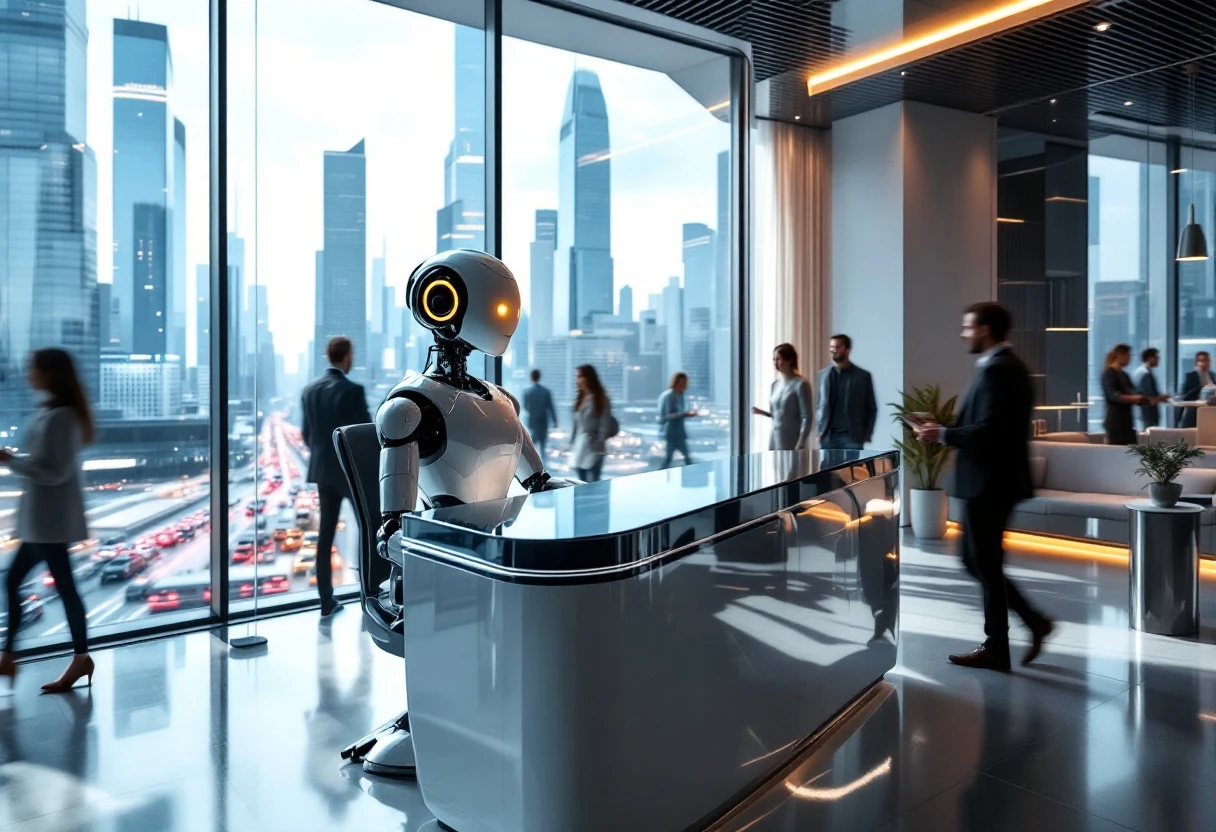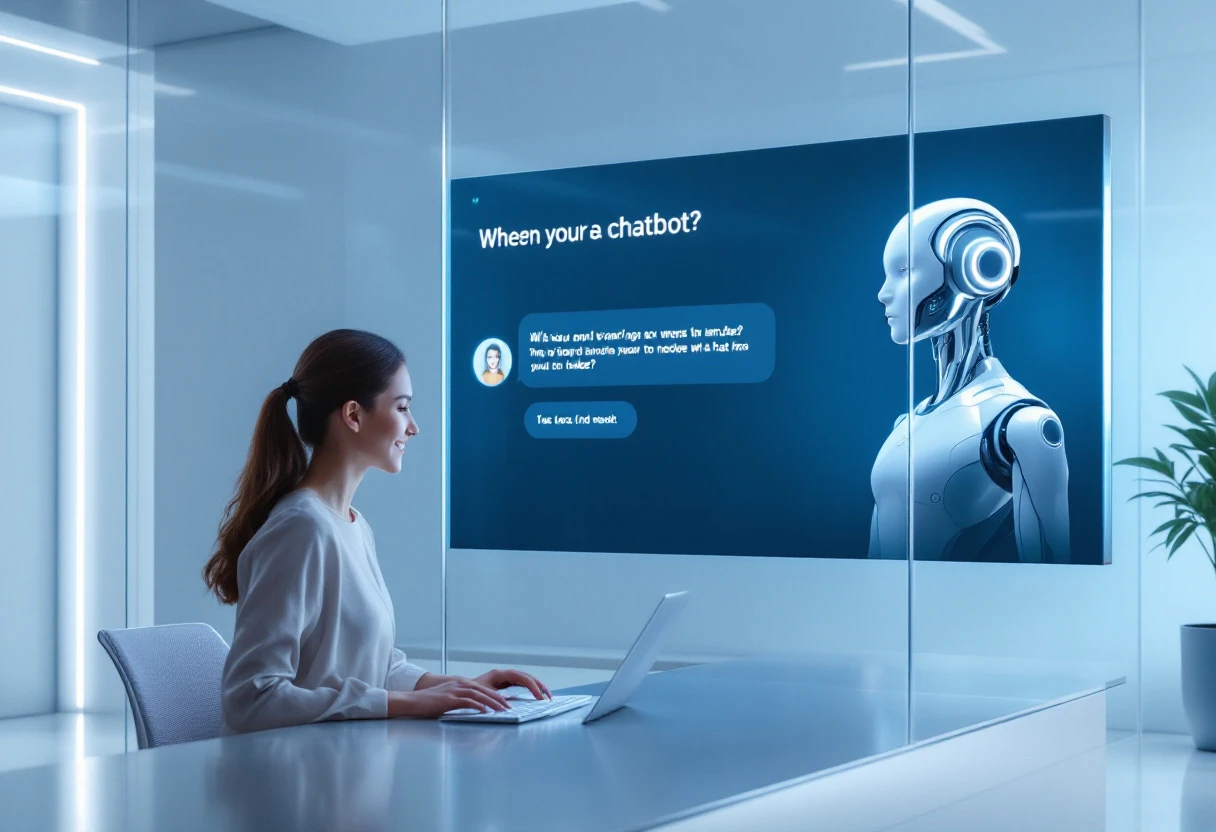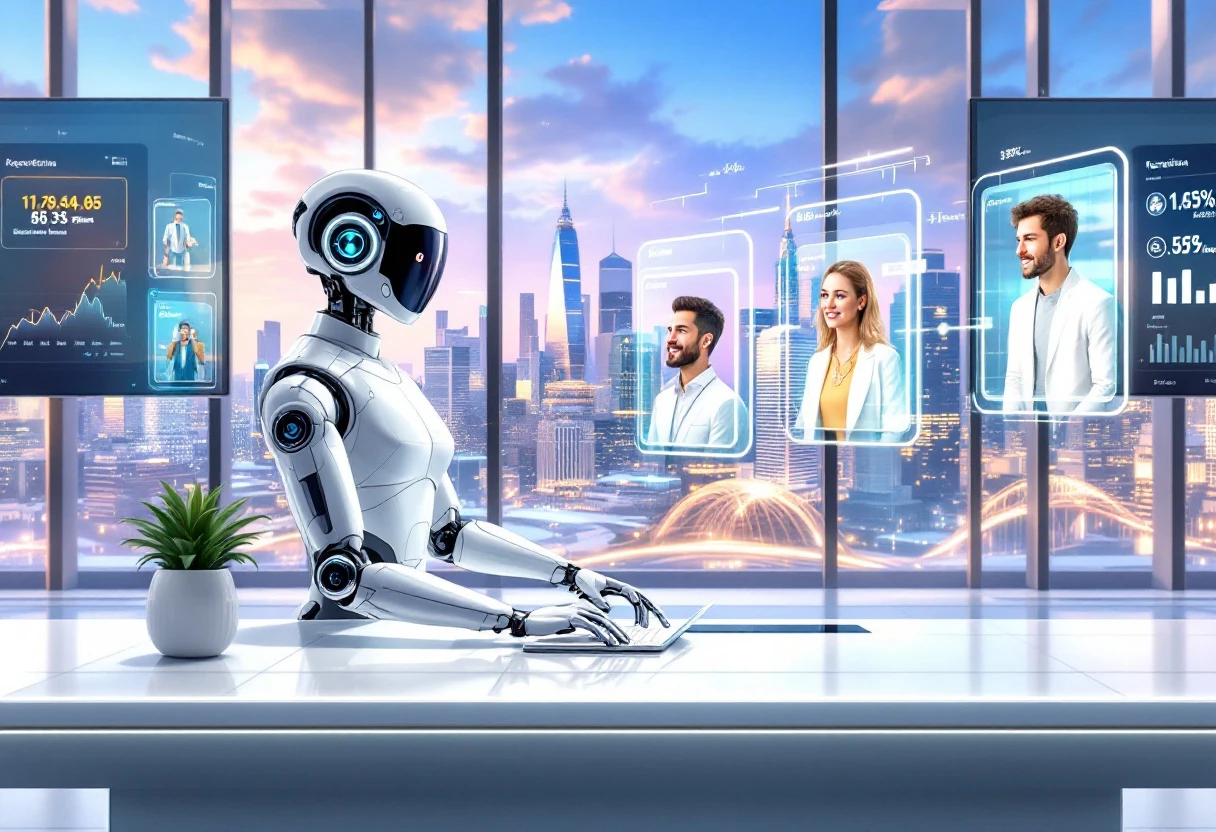
Are you overwhelmed by managing high volumes of customer inquiries and missing opportunities? AI receptionist technology is revolutionizing customer service by enhancing responsiveness and efficiency. By integrating AI solutions, businesses can improve communication, boost customer satisfaction, and ultimately drive sales. Explore how AI receptionists can transform your operations and the key considerations for successful implementation.
For many businesses, managing incoming calls can feel overwhelming. Common issues such as missed calls, slow responses, and resulting customer dissatisfaction pose real challenges. According to a study, 65% of small businesses miss calls every day. This not only hampers customer engagement but also diminishes potential sales leads. A missed call often translates into frustration, causing prospects to seek alternatives. Implementing effective solutions to streamline call management becomes paramount.
Examples abound. A local service business might find its staff stretched thin during peak hours, leading to long hold times. Such delays can drive clients away. If you've noticed similar trends in your company, consider what a productive approach could achieve. AI receptionist technologies can help ease these strains, allowing your team to focus on high-level tasks while ensuring all calls are answered promptly. This is where AI Front Desk can make a significant impact.
Switching to an AI receptionist can address many of the challenges discussed. With capabilities to handle calls 24/7, these systems ensure no opportunity slips through the cracks. Unlike traditional systems, AI receptionists can track client interactions and filter inquiries effectively, prioritizing urgent matters.
“Efficiency in responding to customer needs is crucial for business growth.” — Customer Service Expert
Implementing an AI solution could yield notable benefits:
Consider a case study from a retail client who used AI receptionist to manage fluctuations in call volume. Resultantly, they saw a 30% increase in customer engagement and a 20% boost in sales leads within months. Such statistics point towards a growing trend where businesses leverage technology to streamline their operations.
Transitioning to an AI receptionist involves careful planning. Begin with assessment steps to pinpoint how such a solution can best serve your specific needs. Follow these steps to ensure a smooth rollout:
Data underscores the need for responsiveness. Customers expect swift communication, and those who embrace technology often reap the rewards. As more businesses turn to AI-driven solutions, staying competitive may necessitate such changes. By examining AI receptionist case studies, you gain insight into practical applications and results.

Ultimately, unleashing the potential of an AI receptionist can transform how businesses engage with clients, turning challenges into opportunities. The growing array of solutions available makes transitioning easier than ever, setting the stage for increased sales leads and enhanced customer satisfaction.
One notable case is a mid-sized hotel chain that faced challenges with incoming calls. Many customer inquiries were being missed or dropped, leading to lost bookings. The management implemented an AI receptionist solution from AI Front Desk, which allowed for automated call handling and immediate responses to common questions. As a result, their call handling efficiency improved by 40%.
Furthermore, the AI system enabled the hotel to handle peak times without increasing staff. The implementation also resulted in a 30% reduction in customer drop-off rates, a crucial metric for the hospitality sector.
“Our phone response rate doubled, leading to a direct increase in reservations,” said the hotel's general manager.
This shift can be attributed to the AI receptionist's ability to efficiently manage initial contacts, freeing human staff to engage with customers more meaningfully later in the process. To explore similar innovations in customer service, consider looking into customer service automation strategies.
A forward-thinking e-commerce company realized that customer queries during busy sales periods overwhelmed their support team. By integrating an Automated AI Outbound Phone Calls that sound human system into their website, they could answer FAQs, provide order updates, and assist with returns.
Post-implementation statistics revealed a 50% faster response time to customer inquiries, with users reporting increased satisfaction with the service. What's even more impressive is that sales leads increased by 25% within two months, as the smoother experience encouraged customers to complete their purchases.
Through this transformation, the e-commerce store leveraged its AI receptionist not just to save time but also to build a more engaging customer relationship. Examining recent e-commerce trends shows how essential responsiveness is to customer loyalty.
A real estate agency struggling with lead conversion turned to AI technology after identifying that many inquiries went unanswered after business hours. Implementing AI receptionists allowed them to respond instantly, creating a flush of new leads even late at night. This decision enhanced their operational capacity and responsiveness by ensuring no inquiry went unnoticed. Their conversion rate increased by 35% after the change.
The agency can now provide detailed information on properties and schedule viewings at any time. Adding an AI receptionist shifted their operational paradigm, permitting agents to focus on closing sales rather than managing calls. Developing a good understanding of lead management techniques can also provide valuable insights into optimizing sales strategies.
Each of these case studies highlights how integrating AI receptionist solutions can ripple through various industries, affecting not just efficiency, but also customer satisfaction and sales leads. As businesses look for ways to improve their customer interactions, reviewing the latest robust customer service solutions can yield effective options.

"AI has transformed how we connect with our customers, making each interaction feel tailored and thoughtful." - AI Industry Expert. Additionally, keeping abreast of industry trends can help resellers anticipate changes and adjust their offerings accordingly. Our collection on current AI trends can provide valuable perspectives as you navigate this competitive landscape. This White Label AI Receptionist Reseller Program not only addresses common pain points in setting up a service but also presents a lucrative opportunity to expand your business model. By adopting this structured approach, you’re well on your way to driving success in your ventures alongside AI Front Desk. It’s a path worth considering for any entrepreneur looking to integrate AI into their service portfolio.
Imagine a system that lets you make multiple calls simultaneously. This is the essence of unlimited parallel calling, a feature designed to improve the chances of capturing sales leads. Instead of waiting for one call to finish before beginning the next, your AI receptionist can reach out to several potential clients at once. This approach not only maximizes your outreach but also minimizes the wait time for customers. Businesses that implement this strategy often see a rise in engagement rates.
For instance, a real estate firm using an AI receptionist observed a 40% increase in lead contact rates within just a month. With multiple leads receiving calls at the same time, the chances of conversion grow significantly. Companies looking to boost their outreach can explore trends in business outreach strategies to see how parallel calling fits in.
Integrating your AI receptionist with tools like Zapier can transform the way your business operates. This seamless integration automates various tasks, such as scheduling appointments or updating lead information. When your receptionist collects information from a call, it can trigger a series of actions, saving time and reducing the potential for human error.
For example, when a lead expresses interest during a call, their details can be automatically added to your CRM. This process allows for swift follow-up, keeping the momentum alive. The beauty of such integrations lies in their ability to enhance productivity. Businesses looking to streamline their operations can gain insights by checking workflow automation benefits.
The journey doesn’t end with the initial call. An effective follow-up strategy is crucial for converting leads into customers. Automated follow-up capabilities ensure that no potential client falls through the cracks. With an AI receptionist, you can schedule calls or send personalized messages based on previous interactions.
A recent study showed that companies that utilize automated follow-up systems witness a 23% increase in conversions. The AI can analyze call outcomes, determine the best follow-up strategy, and react accordingly. For organizations eager to know the best practices, exploring sales follow-up strategies can provide practical insights.
“Automation can help businesses uncover hidden opportunities by following up consistently.” – Sales Expert
This commitment to maintaining contact can define how many leads are actually converted into clients. The effectiveness of the AI receptionist in managing these follow-ups can significantly affect your overall sales strategy. As you think about implementing such technology, reviewing case studies of AI solutions can offer valuable examples of success.

Investing in AI receptionist technology opens the door to various possibilities for increased efficiency and customer satisfaction. However, it's crucial to quantify the success of such technology through return on investment (ROI). Companies can gauge the effectiveness of AI solutions by evaluating several key performance indicators (KPIs).
Some critical KPIs include:
For example, a small business that implemented AI solutions saw a 30% improvement in call response times and reported an increase in customer satisfaction scores. This resulted in a notable uptick in their overall revenue, demonstrating the effectiveness of the AI receptionist implementation.
To gain more insights on implementing these measurement techniques, one can look at various benefits of AI technology.
Numerous businesses have shared their success stories after integrating AI receptionist systems into their operations. One case study highlighted a retail company that faced difficulties in handling customer inquiries. By adopting AI receptionists, they achieved:
This approach not only streamlined communication but also provided measurable improvements. As one executive stated,
“The AI system transformed our customer engagement, allowing us to focus on growth while maintaining high satisfaction levels.”
For further reading, exploring other virtual receptionist case studies can provide deeper insights into practical implementations.
Measuring the impact of AI in reception requires a systematic approach:
The success of your AI integration can serve as a powerful testimony. For businesses looking to expand their understanding, reviewing AI implementation strategies can provide targeted insights to enhance their operations.
With continuous measurement and improvement, companies can unlock the true potential of AI receptionist solutions, fostering greater efficiency and boosting their sales leads significantly.
A common misconception is that AI receptionists will replace human jobs. In reality, these technologies are designed to complement human roles, not eliminate them. By taking over routine tasks, AI receptionists allow staff to concentrate on more complex issues and customer interactions. For example, consider a busy dental practice where the receptionist is overwhelmed with calls for appointment scheduling. By integrating an AI receptionist, the practice can manage routine inquiries, freeing up human staff to handle intricacies such as addressing patient concerns or managing unexpected cancellations. This enhances productivity and improves patient experience.
To illustrate this point further, data from the AI impact on job productivity suggests that businesses that adopted AI solutions saw a 25% increase in employee efficiency. This indicates that rather than depleting job opportunities, AI can foster a more engaged workforce.
Another myth suggests that AI receptionists can’t handle complex customer inquiries. In truth, advancements in AI technologies enable them to engage in context-aware conversations, ensuring that they understand and respond accurately to customer needs. For instance, when a customer calls a business with specific questions about a service or product, a capable AI receptionist can reply with detailed information while remembering prior interactions.
A practical example comes from a technology firm that implemented AI receptionists to handle customer inquiries. They found that these AI solutions resolved 80% of queries without involving human staff, which left employees available for higher-value tasks like sales and support. This not only improved response times but also increased customer satisfaction scores significantly, as evidenced in their case studies of customer engagement strategies.
AI receptionists are tools designed to assist rather than replace the human touch in customer service. They excel in repetitive tasks, such as appointment scheduling and initial customer queries, which allows human operators to focus on building relationships and closing sales. This synergy is vital, especially in sectors where customer experience is paramount.
"AI will significantly enhance customer service roles by enabling humans to solve more complex problems while handling the routine tasks efficiently." – Industry Expert.
Implementing an AI receptionist can be straightforward. Here’s a step-by-step process to get started:
Many businesses have reported tangible benefits after adopting AI solutions. According to a survey of companies that integrated AI receptionists, over 70% noted an increase in lead generation due to enhanced customer interactions. For more insights on successful implementations, check AI in customer service case studies.

By understanding these truths about AI receptionists, businesses can position themselves not just to survive but thrive. With the ability to improve efficiencies and enhance customer service, embracing this technology is becoming essential across various industries. For a closer look at practical implementations, view AI receptionists effectiveness studies or explore customer engagement solutions. Each resource can provide additional context on optimizing use cases and getting the most out of your AI integrations.
Remember, AI tools like AI Front Desk can transform business operations by automating customer interactions while empowering your staff to engage in more meaningful tasks.
AI has proven to be a game-changer in customer interactions, reducing response times and increasing satisfaction." - Industry Expert Considering trends such as increased customer expectations for immediate assistance, incorporating AI receptionists into business strategies isn't just beneficial; it’s essential. By utilizing the AI Front Desk platform, businesses can stay ahead of the competition and enhance customer relations. A clear understanding of the potential of AI receptionists, a strategic approach to implementation, and an openness to future innovations equip businesses to thrive in a tech-driven market. Exploring customer service statistics can further bolster your understanding of the impact of AI in this space. Through carefully studying relevant AI receptionist case studies, businesses can anticipate challenges and prepare solutions that enhance their customer service strategies. With each passing day, it becomes clearer that AI is not just an option but a necessity for sustainable growth.
An AI receptionist is a software solution that automates customer interactions, such as answering calls and responding to inquiries. It helps businesses manage communication more efficiently, especially during peak times.
AI receptionists enhance customer service by providing quick responses, 24/7 availability, and handling large volumes of inquiries without delay. This ensures customers receive timely assistance, leading to higher satisfaction.
No, AI receptionists are designed to assist human staff rather than replace them. By managing routine tasks, AI allows employees to focus on more complex customer needs and improve overall service.
Key benefits include reduced workload for staff, improved response times, and enhanced customer engagement. Businesses using AI receptionists often see an increase in lead generation and overall sales.
To implement an AI receptionist, assess your current communication needs, choose a suitable provider, ensure compatibility with existing systems, and train your staff on its use. Regularly monitor performance to make necessary adjustments.
While there may be initial costs, AI receptionist technology often results in long-term savings through increased efficiency and reduced operational costs. Many businesses experience a positive return on investment within a short period.
Yes, modern AI receptionists can manage complex queries by utilizing advanced machine learning algorithms. They are able to understand context and provide detailed responses based on prior interactions.
Success can be measured using key performance indicators like response times, customer satisfaction scores, and lead conversion rates. Regular evaluations help identify areas for improvement and ensure the technology meets your business goals.
Start your free trial for My AI Front Desk today, it takes minutes to setup!






